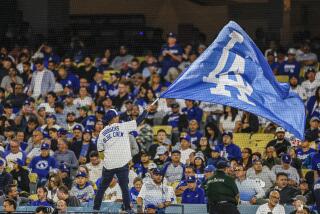Japan Leagues Face a Weekend Strike
- Share via
TOKYO — In a rare show of muscle, Japan’s professional baseball players called their first-ever strike Monday, warning they will sit out all weekend games throughout September unless the powerful group of corporations that runs Japanese baseball backs off plans to shrink the number of teams.
Japan’s Pacific League announced this summer that it wants to merge the struggling Orix BlueWave with the Kintetsu Buffaloes, a move seen as the first step in reducing the number of pro teams from 12 to 10 and an eventual swap of the existing two-league setup for a single one.
“We have to fight,” said Atsuya Furuta, a catcher with the Yakult Swallows who heads the 752-member players’ association that gave its leadership the right to strike in a vote held last month.
Fans have reacted angrily to what they see as a self-interested retreat by a cozy club of owners unwilling to surrender influence by considering options other than contraction.
Critics say clubs and jobs could be saved by better sharing of TV revenues or by allowing new ownership groups to buy into baseball.
The players are demanding the merger be shelved for a year while all sides work out a way to resurrect the economic and entertainment fortunes of Japanese baseball.
But a strike would be a huge gamble for athletes accustomed to playing the role of grateful workers in a sport that operates on almost feudal lines.
“The owners denied the players the right to even speak to them, and the union needed to stand up now or lose the support of the fans,” says Itaru Kobayashi, a former pitcher for the Chiba Lotte Marines in the early 1990s.
So far, the owners have shown no inclination to let anyone meddle in their game. They rejected an offer last month by rich young media mogul Takafumi Horie to buy the Buffaloes and keep them alive, then said they were not interested in allowing him to start a franchise that would keep the number of teams at 12.
The owners greeted Monday’s strike announcement by vowing to go ahead with the merger, warning they could sue the players for any lost TV and ticket revenues.
Yet perhaps mindful of the battle for fan opinion, some owners did acknowledge that cancellation of up to 30 games during pennant races could have severe consequences on a business already squeezed by economic troubles.
“It’s a very tough strategy that they chose Saturdays and Sundays,” Hanshin Tiger President Katsuyoshi Nozaki said. “Nothing is going to work out right if we fail to live up to expectations of the fans and baseball loses its popularity because of the strike.”
More to Read
Go beyond the scoreboard
Get the latest on L.A.'s teams in the daily Sports Report newsletter.
You may occasionally receive promotional content from the Los Angeles Times.










